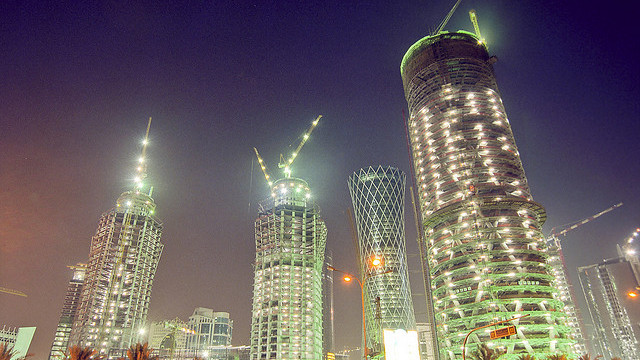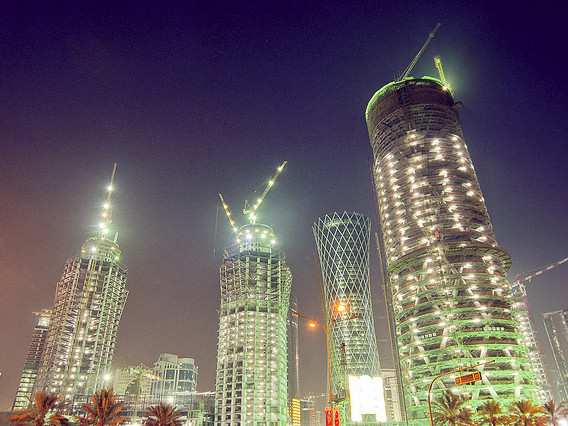
When Qataris learned they were chosen to host the global spectacle that is the 2022 World Cup, the successful bidders celebrated — and then hired slaves to get the production underway, allegedly.
A groundbreaking report issued by The Guardian included documents leaked through the Nepalese embassy, indicating a common trend of death among those submitted to alleged forced labor — from June 4 to Aug. 8, 44 workers were documented as dead, according to the documents.
The deaths, according to the documents, have largely been due to heart attacks, work-related accidents or heart failure, particularly among older workers. While the official World Cup structures have not yet been built, the allegations stem from immigrant workers who have been a part of the construction of entire cities, whose main purposes are intended for World Cup events.
According to the Council on Foreign Relations, Qatar’s total construction projects are expected to amount to more than $100 billion.
Referring to as modern-day slavery, The Guardian sourced Nepalese documents that allegedly indicated workers were denied access to water and food. In one case, a group of workers fled to Doha to retreat from working conditions and harsh management.
Other workers claimed bosses wouldn’t allow them to leave, instead inflicting — and threatening — abuse against immigrant workers, many of whom were Nepalese.
“We were working on an empty stomach for 24 hours, 12 hours’ work and then no food all night,” 27-year-old Ram Kumar Mahara told the publication. “When I complained, my manager assaulted me, kicked me out of the labor camp I lived in and refused to pay me anything. I had to beg for food from other workers.”
The documents also revealed dangerous and uncomfortable living arrangements, with 12 people living in one unit, oftentimes lending to the circulation of illnesses in unkept and unclean areas.
Meanwhile, Nepal’s ambassador to Qatar, Maya Kumari Sharma, has been recalled following her remarks that Qatar was “an open jail” for Nepali workers flooding the country’s World Cup-related construction scene.
All of the claims should come of no surprise, as Qatar’s history of slave labor goes back beyond The Guardian’s report. In 2012, the International Business Times reported Qatar’s win for the 2022 World Cup as “something of a surprise.” Even at the time it was given the honor of hosting the World Cup, human rights organizations, including Human Rights Watch had documented unsafe and unhealthy working conditions, claiming the country’s sponsorship program for migrant workers was a ploy for creating a system of modern-day slavery.
The list goes on
While the revelations of forced labor in a country that was just granted the privilege of hosting a national sporting event was enough to stir pause throughout the world, reports that slaves were used to construct World Cup structures sent the controversy over the edge.
“We’d like to leave, but the company won’t let us,” one Nepalese worker who has contributed to the construction of Lusail City, a place that is being constructed solely for the purpose of the World Cup, told The Guardian. “I’m angry about how this company is treating us, but we’re helpless. I regret coming here, but what to do? We are compelled to come just to make a living, but we’ve had no luck.”
This is the scenario playing out among many of Lusail City migrant workers, who jumped at an opportunity to make money while being a part of history in the making. While the proposed stadiums have not been built, Qatar has begun to create entire cities for the event — Lusail City is one of these.
Now, the dream of earning a wage to support their families is drifting away, as they’re caught in the midst of forced labor, without payment.
Anti-slavery organizations throughout the world are pouncing on Qatar, claiming the scenario is one that exposes the country’s slavery practices.
“The evidence uncovered by The Guardian is clear proof of the use of systematic forced labor in Qatar,” Aidan McQuade, director of Anti-Slavery International, told ESPN. “In fact these working conditions and the astonishing number of deaths of vulnerable workers go beyond forced labor to the slavery of old where human beings were treated as objects. There is no longer a risk that the World Cup might be built on forced labor. It is already happening.”
FIFA praises Qatar
Yet even in the midst of this controversy, FIFA, the international governing body of the event, is sticking to its guns. In a statement, it claims to consider the allegations, but also claims the national event could serve as a means to pressure the country’s companie to comply with international law.
“The health, safety, well-being and dignity of every worker that contributes to staging the 2022 Fifa World Cup is of the utmost importance to our committee and we are committed to ensuring that the event serves as a catalyst toward creating sustainable improvements to the lives of all workers in Qatar,” the World Cup statement reads.
The Qatar 2022 Supreme Committee for the World Cup told The Guardian that it was concerned about the allegations.
“We have been informed that the relevant government authorities are conducting an investigation into the allegations,” it told the publication.
The Supreme Committee was more vocal about its opposition after the story broke. In an interview with ESPN, it said it was “appalled” by the report.
“There is no excuse for any worker in Qatar, or anywhere else, to be treated in this manner. The health, safety, well-being and dignity of every worker that contributes to staging the 2022 FIFA World Cup is of the utmost importance to our committee and we are committed in ensuring that the event serves as a catalyst toward creating sustainable improvements to the lives of all workers in Qatar,” it stated, adding a clarification that it is their “top priority” as they prepare for the World Cup.
In 2012, FIFA delegates applauded Qatar for its vision in executing the major global event.
“It was FIFA’s first visit since the bid inspection. We are impressed by the overall vision developed by the Qataris and the first steps of the preparations taken already. It is great to see the commitment and excitement of the 2022 Supreme Committee and other key stakeholders to create amazing,” Mustapha Fahmy, FIFA’s competitions director, stated in a 2012 press release. “We are looking forward to continuing the path started over the last few days and seeing these visionary projects coming together on the way to the first FIFA World Cup in the Middle East.”
Is this a surprise?
Qatar isn’t necessarily considered throughout the globe as the beacon of freedom and humanity, so while evidence of modern-day slavery circulates and shocks the sports world, it’s not too far of a stretch for organizations that have monitored the depleting human rights situation in Qatar.
Human Rights Watch issued a report indicating the country’s 90 percent migrant worker employment force, the highest ratio of non-citizen workers in the world, has been a part of the problem for Qatar’s weak human rights record.
“Forced labor and human trafficking are serious problems,” HRW indicates on its Qatar profile, going on to highlight another issue related to media suppression.
“A new draft media law was passed that may jeopardize Qatar’s reputation as a center for media freedom, and a poet was sentenced to life imprisonment,” HRW states. “Local media tend to self-censor, and the law permits criminal penalties, including prison terms, for defamation.”
The government of Qatar owns Al Jazeera, a global news outlet that has been considered an independent voice. Yet, as noted in the HRW statement, the new media law goes against that philosophy. Prior to the change of law in 2012, the government created the Doha Media Center for Freedom, established in 2008.
According to a 2012 HRW press release, the rule could lead to prosecution of those who “throw relations between the state and the Arab and friendly states into confusion.” Offending the royal family or causing “serious harm to the national or higher interests of the state” is also included in the new media provisions.


